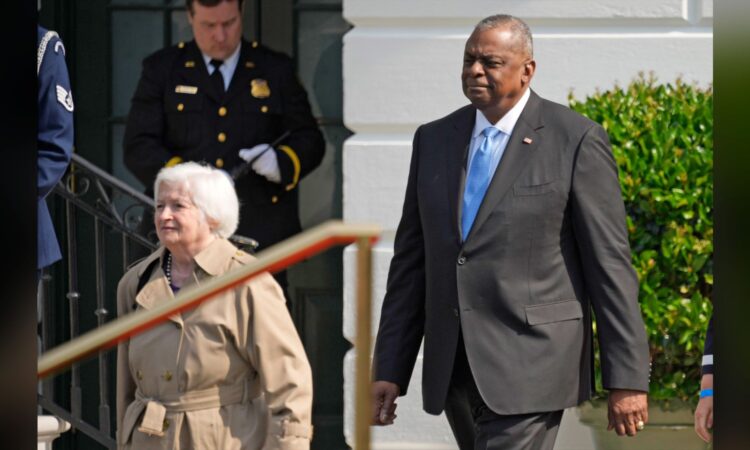
Two recent speeches by key members of the Biden administration have underscored that US economic policy is integrally connected to a confrontation with China under the banner of ensuring “national security.”
In an address at the Johns Hopkins University on April 20, dealing with US-China economic relations, Treasury Secretary Janet Yellen insisted, that while the US did not seek a “decoupling” from China, it would assert its national security interests above all else.
Technology bans imposed by the US, she claimed, were not designed to “stifle” China’s economic development but were targeted measures over national security considerations.
However, as economic historian Adam Tooze pointed out in response to Yellen’s speech, “those targeted measures have so far included massive efforts to hobble the world leader in 5G technology, Huawei, sanctions against the entire chip industry supply, and the inclusion of most major research universities in China on America’s entities list that strictly limits trade.”
Yellen’s speech was followed a week later by an address from National Security Advisor Jake Sullivan to the Brookings Institution on the subject of “renewing American economic leadership.”
While Yellen sought to cover over the driving forces of the increasing militarism directed against China, saying the US had nothing to fear from competition as it was the strongest economy in the world, Sullivan’s remarks made clear that concerns over the American decline are front and centre.
He began by noting that shifts in the global economy had left many working Americans behind, a financial crisis had shaken the middle class, the pandemic exposed the fragility of global supply chains, climate change threatened lives and livelihoods and the Russian invasion of Ukraine underscored the risks of overdependence—a reference to the cutting of energy supplies in Europe.
The decline was the result of the unrestrained “free market” agenda promoted by the US, sometimes referred to as the “Washington consensus,” which had weakened its position and that the present moment “demands that we forge a new consensus.”
The “new Washington consensus,” he said, would not be “America alone” but in effect an alliance of major powers prepared to accept American domination directed essentially against those that did not, above all China.
Sullivan spent some time detailing the decline in American economic power.
“America’s industrial base had been hollowed out,” he said.
While not discounting markets, he said that “in the name of oversimplified market efficiency, entire supply chains of strategic goods—along with the jobs and industries that went with them—moved overseas.”
He alluded to the growth of financial parasitism, while not naming it as such, which has come to play such a dominant role in the US economy. There was an assumption that all growth was good, and the type of growth did not matter.
“So various reforms combined and came together to privilege some sectors of the economy, like finance, while other essential sectors, like semiconductors and infrastructure, atrophied. Our industrial capacity—which is crucial to any country’s ability to continue to innovate—took a real hit.”
The “shocks” of the global financial crisis and the global pandemic had laid bare the limits of the previous assumptions.
At the same time, China had undertaken massive expansion in traditional areas such as steel as well as in “the key industries of the future, like clean energy, digital infrastructure and advanced biotechnologies. America just didn’t lose manufacturing—we eroded our competitiveness in critical technologies that would define the future.”
It had been hoped that the previous “Washington consensus,” by “bringing countries into the rules-based order would incentivise them into adhere to its rules”—that is, submit to US dominance.
But in the case of China, that had turned out not to be the case, and when Biden came to power “we had to contend with the fact that a large non-market economy had been integrated into the international economic order in a way that posed considerable challenges.”
He highlighted the significant lag of the US in the development of the new technologies of the future and the access to the raw materials on which they depend.
“America now manufactures only around 10 percent of the world’s semiconductors and production—in general and especially when it comes to the most advanced chips—is geographically located elsewhere.”
Regarding critical minerals, vital for a clean energy future, the situation was just as bad as high-tech.
“Today, the United States produces only 4 percent of the lithium, 13 percent of the cobalt, 0 percent of the nickel and 0 percent of the graphite required to meet current demand for electric vehicles. Meanwhile, more than 80 percent of critical minerals are processed by one country, China.”
Sullivan’s remarks underscore a vital issue raised by Lenin in his work Imperialism laying bare the objective driving forces which led to the eruption of World War 1 and which continue to powerfully operate in the present day.
“The more capitalism develops,” he wrote, “the more the need for raw materials arises, the more bitter competition becomes, and the more feverishly the hunt for raw materials proceeds all over the world, the more desperate becomes the struggle for the acquisition of colonies.”
Sullivan said it was neither possible nor desirable for the US to try to build everything domestically and the objective was not autarky but “resilience and security in our supply chains.” The US was committed to an industrial strategy at home “while we are unambiguously committed to not leaving our friends behind.”
But how a “friend” is determined depends on whether they are prepared to submit themselves to the geostrategic and political objectives of US imperialism. That is, the aim of the new “consensus” is a bloc based on US supremacy and committed to the view that the economic and technological rise of China is a danger which must be suppressed at all costs.
Laying out this objective is one thing, achieving it is another because, as the British foreign secretary of the 19th century Lord Palmerston famously remarked, there are no eternal allies, only eternal interests.
And the US has shown that when it comes to defending those interests it will act ruthlessly against “friend” and foe alike.
This has been seen in the threat to impose measures against European companies dealing with Iran in defiance of US sanctions and the US opposition to the Nord Stream gas pipeline from Russia into Germany, amid evidence that its blowing up was carried out either directly by or through forces under its control.
At present, the other imperialist powers believe they have no choice but to comply with US dictates and are not yet able to challenge them. But how long that continues is another question because they all have their own imperialist interests and appetites, some of them centring on China, which do not necessarily coincide with those of the US.
The new industrial strategy has already caused friction with the European Union denouncing the Inflation Reduction Act, which provided major handouts to US industry involved in green energy, as giving rise to “serious concerns” over the financial incentives in the plan which threaten European industry.
Sullivan claimed the Act was going to be “leveraged” and will be turned from a source of friction to one of “strength and reliability.” There may well be some patch-up measures. But the thrust of his speech scotches any conception that US imperialism is willing to tolerate what has been touted by some pundits as a “multipolar” world peacefully regulated by the imperialist powers.
In advancing this program, the administration is relying directly on the trade union bureaucracy to sell and impose it. To this end there were references in the speech that the previous agenda had boosted the wealthy and hollowed out manufacturing communities and the aim of the new program was to carry forward innovation and create good jobs.
This is a fiction just as much as was the previous claim that “trickle-down economics,” which further enriched the already fabulously wealthy, would “lift all boats.”
The “new Washington consensus” is that the industrial and technological sinews of war must be strengthened and brought together. This economic war drive means deeper attacks on the working class at home in conditions where its fight against worsening social conditions will be denounced as endangering national security.














